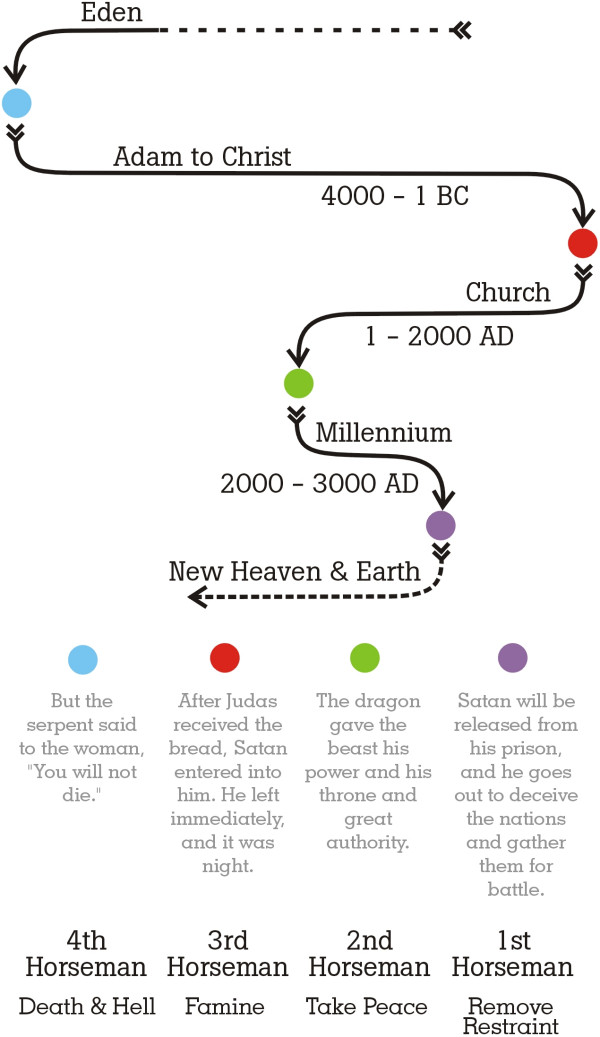The most profitable thing we can learn from the history of booms and busts is that at times of great optimism, future returns are lowest; when things look bleakest, future returns are highest. Since risk and return are just different sides of the same coin, it cannot be any other way.
William Bernstein, The Four Pillars of Investing
When people are saying, “Peace and Security,” then sudden destruction shall come upon them.
Paul the Apostle
For anyone who has read my blog, you know he had me at four, and what we are looking at in this posting is one of the four horsemen.
It is pretty common doctrine to see the end times as posing great risk. I believe it is important to realize that this great risk leads to great reward. But as was said in the last post, we generally read in judgment, not reward. We see only the side of the coin meant for those who do not believe. Yet Christ states,
Behold I come and my reward is with me.
This Coming of the Lord is all part of that spiritual birth that has also been discussed. That birth is seen in the opening of the seals. And the first seal that is opened releases the rider on the white horse. In Tim’s Exhausting Translation, this verse reads as follows:
Behold the standard bearer; he removes restraint; he is given a bride; he is revealed through a release of his people.
What we are going to examine in this post is the idea of the removal of restraint.
The phrase the removal of restraint has popped up before in this blog. This part of the verse is usually translated as he had a bow, and that bow is generally seen as a war bow. In the Greek the word bow in this verse is toxon, from which comes our English word toxic. The yew tree (taxus) is also named from this root, as arrows were poisoned using the yew. To complete this circle, one of the main woods used to manufacture the longbow was yew. Carolyn’s first chemotherapy was Taxotere, derived from the yew. We used to joke that it was a natural chemo.
Your insight may have shown you by now that I am going to have a problem with this translation; however, linguistic argumentation is usually eristically soporific so let us get this over with as quick as possible.
The route I am taking here is seeing the bow as a rainbow. The main objection brought up is that elsewhere in the book of Revelation, iris is used to mean rainbow. Iris was messenger of the gods and she personified the rainbow. It is a good objection but misses the point completely. The bow here is a flag, a beacon, a standard indicating a paralyzation, a poisoning. In the Septuagint, the Greek translation of the Old Testament, the bow God puts in the sky for Noah is translated toxon, not iris.
In Noah’s day, God sets the bow in the sky. God then puts restraint upon himself. “I will not,” he says. Then, two chapters later, we find God putting restraint upon men; “Now, nothing will be restrained from them, so let us go down and confuse their language.”
The rider on the white horse is shown removing the bow; he is removing restraint. This will first be seen among men. Those who believe will become unrestrained in their pursuit of holiness, and those in the world will become unrestrained in their embrace of unrighteousness. There are two groups, those who sow and those who scatter.
Remember the folding. First, God was restrained, and then men were restrained. Now we will find that restraint is first lifted from men, and then lifted from God. Let’s take yet another look at the folds of history diagram:
“So why then,” you may ask, “does this birthing release so much sorrow?” It has to do with the role of Satan. Ezekiel says of Satan:
You are the one sealing the pattern.
So then it only follows that when the seals, which are Satan, are opened, much sorrow will result. You may be thinking that it is impossible that it takes the release of Satan to manifest Christ, but it is just as impossible that death holds the key to eternal life.
The Millennium, that period on the sentence of history, is no dénouement. It is a time of great reward, therefore a time of great risk. It is at the end of the millennial period that we will find the greatest uprising against God; this uprising, the greatest risk, will complete the transition into Kingdom and bring the final and greatest reward. The restraint upon God will be removed.
This posting is getting lengthy, so let us leave the rainbow for next time.

